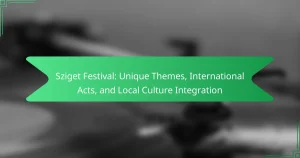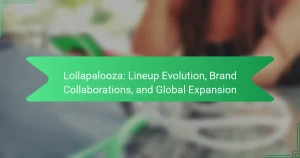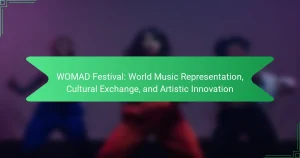Roskilde Festival stands out for its commitment to sustainability, artist diversity, and community engagement. The festival implements eco-friendly practices like waste management and renewable energy. It features a wide range of artists from various backgrounds, promoting inclusivity in the music scene. Local partnerships enhance community involvement, creating a vibrant atmosphere that resonates with attendees.
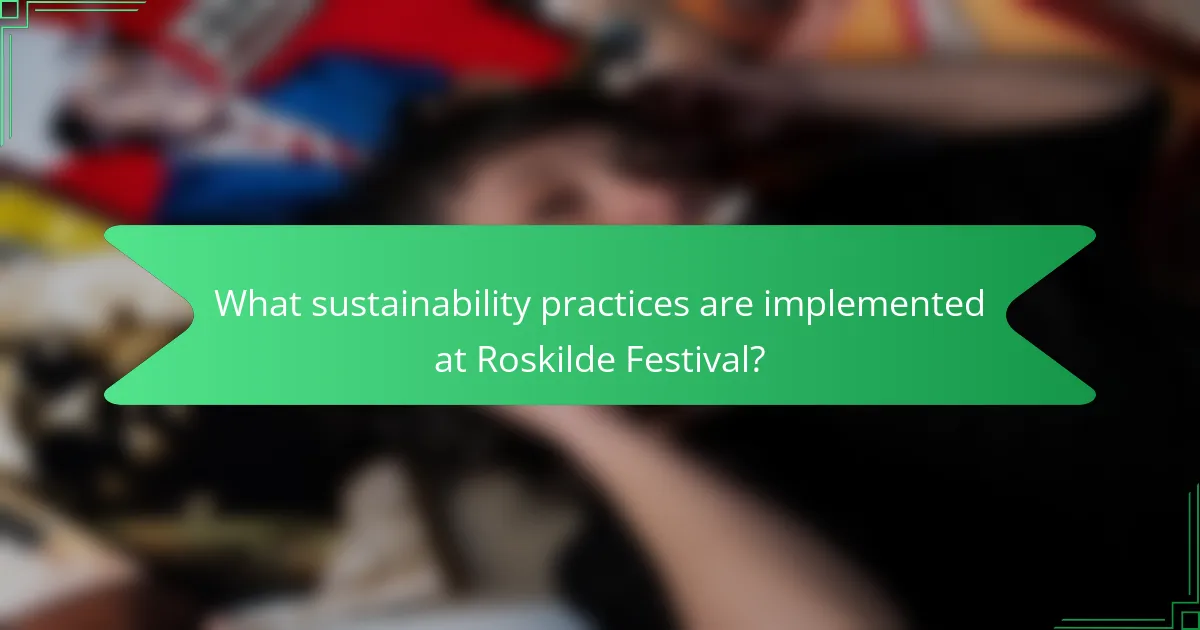
What sustainability practices are implemented at Roskilde Festival?
Roskilde Festival implements various sustainability practices, including waste management, renewable energy, and local sourcing. The festival aims to minimize its environmental impact while promoting social responsibility. Initiatives include a comprehensive recycling program that achieved a 70% waste diversion rate in recent years. Additionally, the festival uses solar panels and biodiesel for energy, reflecting its commitment to renewable resources. Community engagement is fostered through partnerships with local organizations, enhancing the festival’s positive social footprint.
How does waste management contribute to sustainability efforts?
Waste management significantly enhances sustainability efforts by reducing environmental impact and promoting resource conservation. Effective waste management practices at events like Roskilde Festival minimize landfill contributions and encourage recycling. This results in lower carbon emissions and fosters a circular economy. Additionally, engaging the community in waste reduction initiatives raises awareness and strengthens collective responsibility toward sustainability.
What renewable energy sources are utilized during the festival?
Roskilde Festival utilizes solar power, wind energy, and biofuels to promote sustainability. Solar panels provide electricity for stages and facilities. Wind turbines contribute renewable energy, while biofuels power transportation and equipment. These practices enhance the festival’s commitment to environmental responsibility.
Which sustainable transportation options are promoted for attendees?
Roskilde Festival promotes several sustainable transportation options for attendees, including public transport, cycling, and carpooling initiatives. Public transport options such as trains and buses reduce carbon emissions. Cycling facilities encourage eco-friendly travel, while carpooling programs help minimize the number of vehicles on the road. These practices align with the festival’s commitment to sustainability and community engagement.
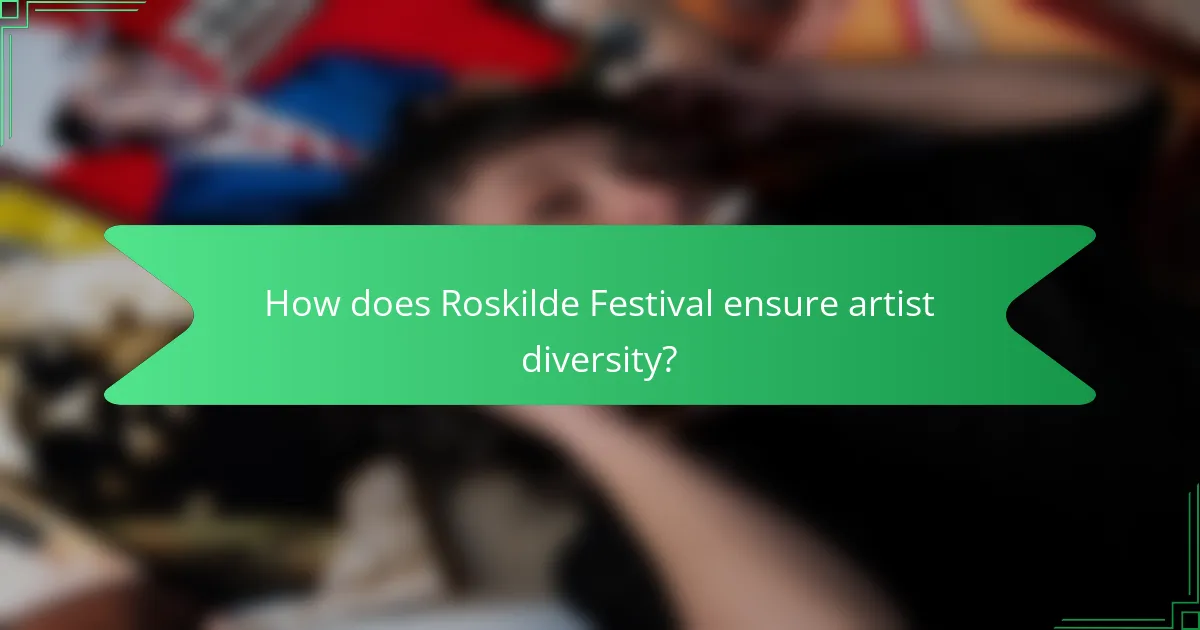
How does Roskilde Festival ensure artist diversity?
Roskilde Festival ensures artist diversity through a commitment to inclusive programming and representation. The festival actively seeks artists from various genres, backgrounds, and cultures to create a rich lineup. This approach fosters a vibrant atmosphere and supports underrepresented voices in the music industry. Additionally, the festival collaborates with organizations that promote diversity, enhancing its outreach and impact. By prioritizing diverse talent, Roskilde Festival enriches the cultural experience for attendees and contributes to a more equitable music scene.
What measures are taken to include underrepresented genres and artists?
Roskilde Festival actively promotes underrepresented genres and artists through targeted initiatives. The festival collaborates with diverse curators to ensure a wide range of musical styles is represented. Additionally, they provide platforms for emerging artists, offering opportunities for exposure and performance. This commitment to diversity enhances the festival’s cultural richness and fosters inclusivity. By prioritizing underrepresented voices, Roskilde Festival strengthens its community engagement and sustainability practices.
How does the festival support emerging artists?
The Roskilde Festival supports emerging artists by providing a platform for exposure and networking opportunities. The festival features a dedicated stage for new talent, allowing them to perform alongside established acts. This initiative fosters artist diversity and encourages collaboration within the music community. Additionally, the festival offers mentorship programs that connect emerging artists with industry professionals, enhancing their skills and visibility. Through these practices, Roskilde Festival plays a crucial role in nurturing the next generation of musicians.
Which initiatives promote gender equality among performers?
Roskilde Festival promotes gender equality among performers through initiatives like gender-balanced lineups and support programs for female artists. The festival prioritizes diversity, aiming for equal representation in its artist selection. Additionally, workshops and mentorship opportunities enhance visibility for underrepresented groups.
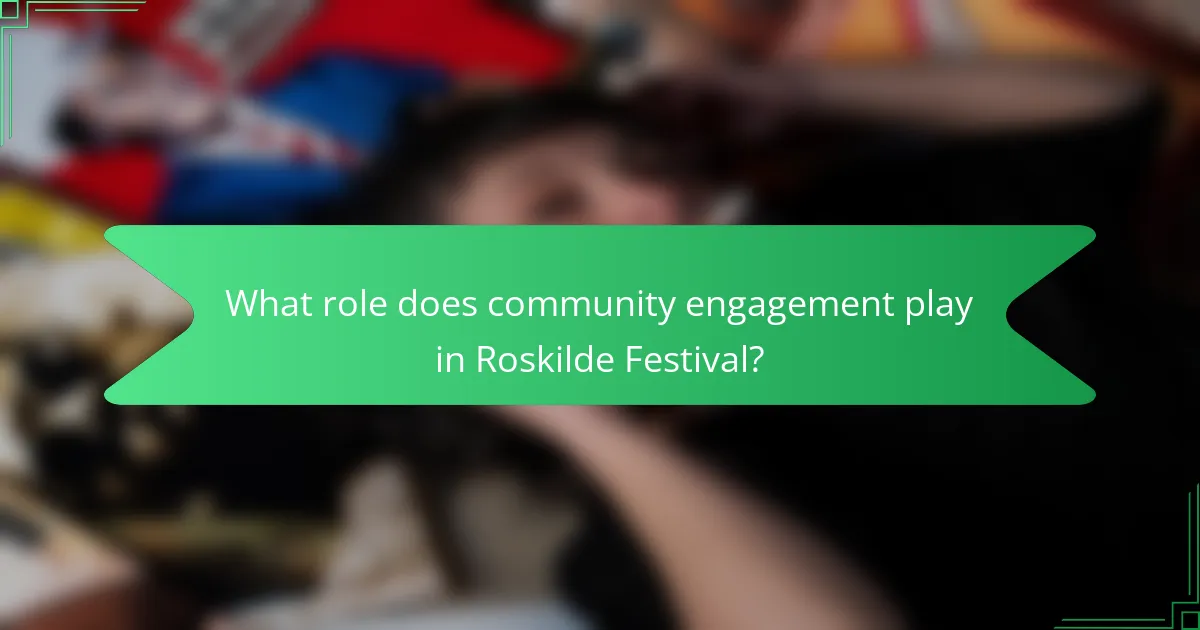
What role does community engagement play in Roskilde Festival?
Community engagement is vital to Roskilde Festival, fostering connections among attendees and local communities. It enhances social cohesion and promotes sustainability initiatives. The festival involves locals in planning and volunteering, ensuring diverse perspectives shape the event. This engagement leads to a unique festival atmosphere, where cultural exchange thrives and community bonds strengthen.
How does the festival collaborate with local organizations?
The Roskilde Festival collaborates with local organizations to enhance community engagement and sustainability. This partnership fosters initiatives that support local artists, promote environmental practices, and involve local businesses. For instance, the festival works with local NGOs to implement recycling programs and reduce waste. Additionally, it features performances by regional artists, showcasing their talent and enriching the cultural landscape. This collaboration strengthens community bonds and contributes to the festival’s commitment to social responsibility.
What programs are in place to involve volunteers from the community?
Roskilde Festival engages community volunteers through various programs. These include opportunities for local residents to participate in festival planning, on-site support roles, and environmental initiatives. Volunteers can also join workshops focused on sustainability practices and artist diversity. The festival fosters a sense of community by encouraging collaboration among volunteers, artists, and attendees.
How does Roskilde Festival address social issues through its programming?
Roskilde Festival addresses social issues through its programming by promoting inclusivity, environmental sustainability, and community involvement. The festival actively features diverse artists, ensuring representation across genres and backgrounds. It implements eco-friendly practices, such as waste reduction and renewable energy use, to raise awareness about environmental challenges. Additionally, the festival engages local communities through volunteer opportunities and partnerships with social organizations, fostering a sense of belonging and responsibility. These initiatives reflect the festival’s commitment to addressing pressing social issues while providing a platform for artistic expression.
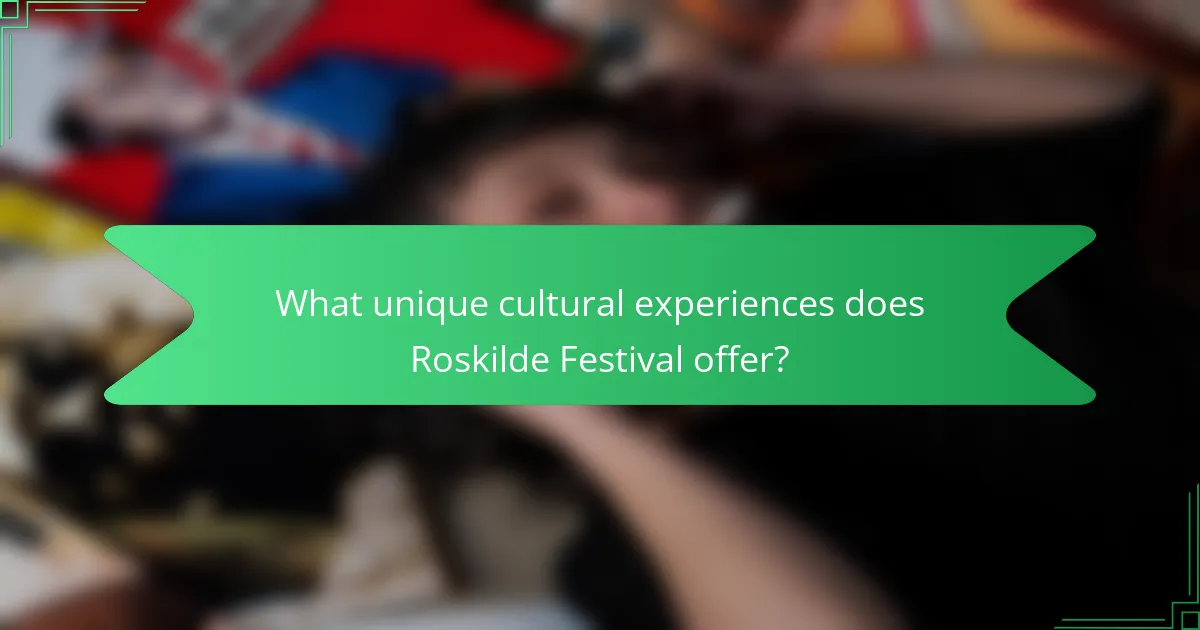
What unique cultural experiences does Roskilde Festival offer?
Roskilde Festival offers unique cultural experiences through its commitment to sustainability, diverse artist lineups, and strong community engagement. The festival promotes eco-friendly practices, such as waste reduction and renewable energy use. It features a broad range of musical genres, showcasing both established and emerging artists from around the world. Additionally, the festival fosters community involvement by encouraging local participation and supporting social initiatives, creating a rich cultural tapestry that resonates with attendees.
How does the festival integrate local traditions and customs?
The Roskilde Festival integrates local traditions and customs through various cultural showcases and community involvement. It features performances by local artists, traditional food vendors, and workshops that highlight regional crafts. This fosters a sense of belonging and celebrates the area’s heritage. Additionally, the festival collaborates with local organizations to ensure that community voices are represented, enhancing cultural exchange and engagement.
Which artistic installations and performances are exclusive to Roskilde?
Roskilde Festival features exclusive artistic installations and performances that emphasize sustainability and community engagement. Notable installations include large-scale art pieces made from recycled materials and interactive performances that encourage audience participation. These unique attributes enhance the festival’s commitment to environmental awareness and cultural diversity. Additionally, local artists often showcase their work, creating a distinctive blend of global and regional artistic expressions.
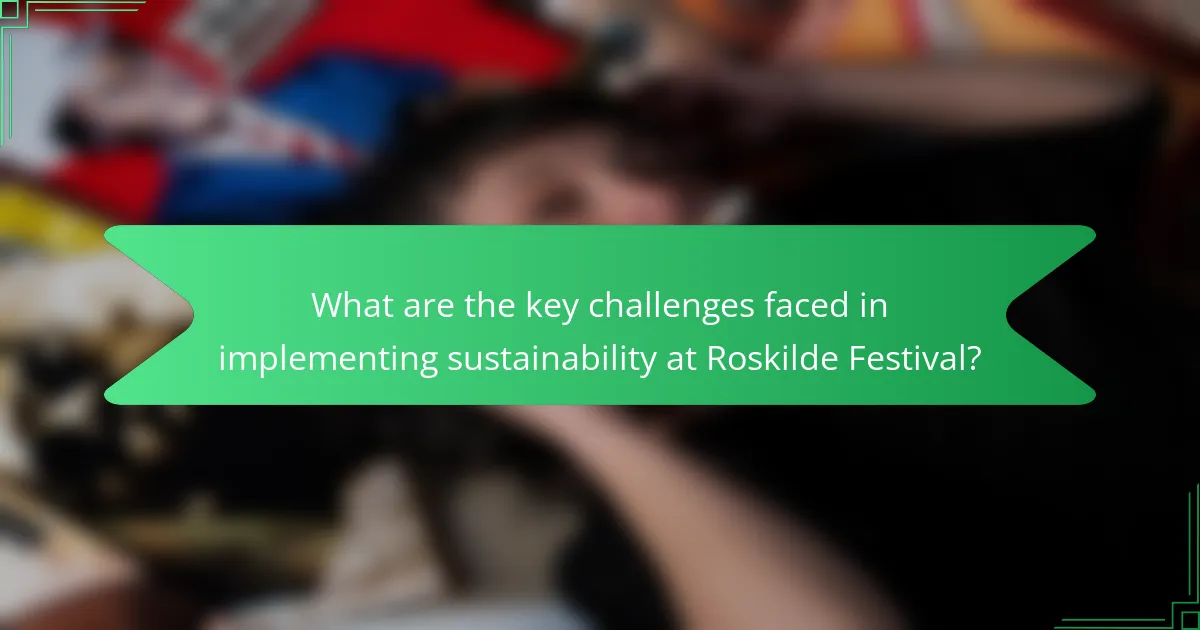
What are the key challenges faced in implementing sustainability at Roskilde Festival?
Roskilde Festival faces several key challenges in implementing sustainability, including waste management, resource allocation, and stakeholder engagement. Waste management is crucial due to the festival’s large audience, generating significant waste. Efficient recycling and composting systems are needed to minimize landfill contributions. Resource allocation involves balancing sustainability initiatives with budget constraints, which can limit the scope of eco-friendly practices. Stakeholder engagement is vital for fostering collaboration among artists, vendors, and attendees, ensuring collective commitment to sustainability goals. Addressing these challenges is essential for enhancing the festival’s environmental impact and community involvement.
How do weather conditions impact sustainability efforts?
Weather conditions significantly influence sustainability efforts at the Roskilde Festival. Extreme weather can disrupt waste management, energy consumption, and resource allocation. For example, heavy rain may lead to increased waste due to damaged materials, while high temperatures can elevate energy usage for cooling and hydration. Additionally, adverse weather can affect community engagement, as attendees may be less willing to participate in outdoor activities. The festival’s adaptability to these conditions showcases its commitment to sustainable practices.
What logistical issues arise in managing artist diversity?
Managing artist diversity at Roskilde Festival involves logistical issues such as scheduling conflicts, resource allocation, and communication barriers. Diverse artists may have varying needs and expectations, complicating coordination efforts. For instance, differing performance styles may require unique technical setups, affecting stage management. Additionally, cultural differences can lead to misunderstandings, necessitating careful planning and sensitivity training for staff. Addressing these challenges is essential for fostering an inclusive environment while maintaining operational efficiency.
How does funding affect community engagement initiatives?
Funding significantly enhances community engagement initiatives by providing necessary resources. Increased financial support allows for diverse programming, outreach efforts, and collaboration opportunities. For instance, Roskilde Festival utilizes funding to implement sustainable practices and promote artist diversity, which fosters deeper community connections. As a result, well-funded initiatives often yield higher participation rates and more impactful outcomes.
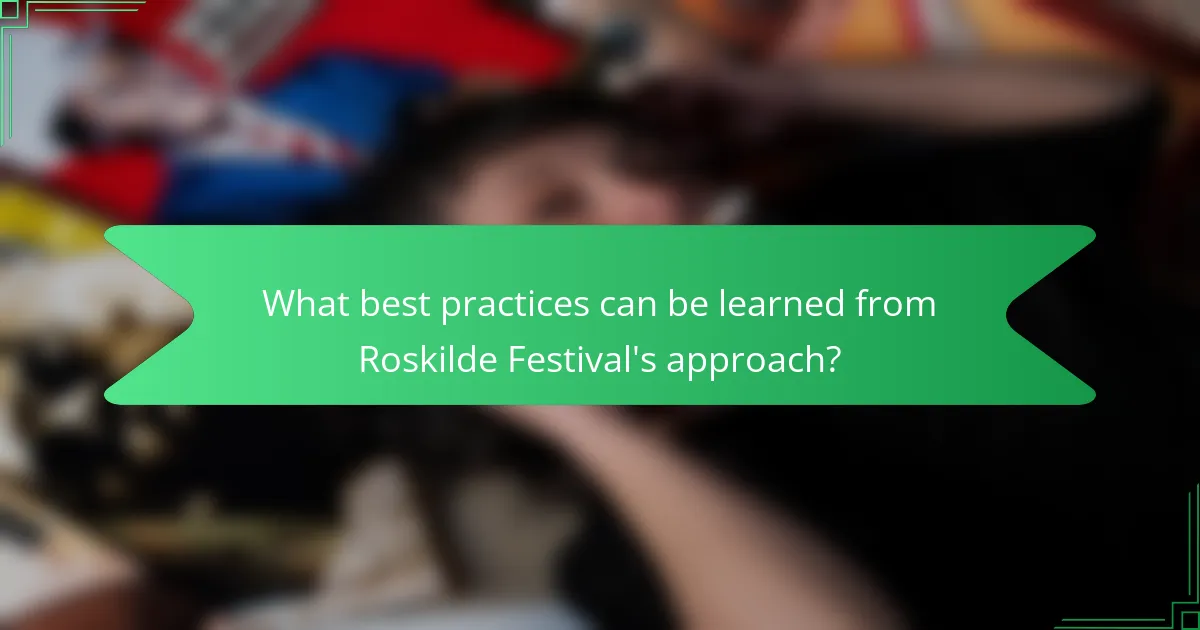
What best practices can be learned from Roskilde Festival’s approach?
Roskilde Festival exemplifies best practices through its commitment to sustainability, diverse artist representation, and community involvement. The festival prioritizes eco-friendly initiatives, such as waste reduction and renewable energy use, which significantly lower its environmental impact. Artist diversity enhances cultural richness, showcasing a wide range of genres and backgrounds, fostering inclusivity. Community engagement is evident in local partnerships and volunteer opportunities, strengthening ties with the surrounding area and promoting social responsibility. These practices contribute to a holistic festival experience that aligns with contemporary values.
How can other festivals replicate Roskilde’s sustainability model?
Other festivals can replicate Roskilde’s sustainability model by adopting similar practices focused on environmental responsibility and community involvement. Key strategies include implementing waste reduction initiatives, promoting renewable energy sources, and engaging local communities in planning and execution. For example, Roskilde Festival uses a comprehensive recycling program that reduces waste by 50%. Additionally, festivals can prioritize artist diversity to enhance cultural representation and foster inclusivity. Collaboration with local organizations can further strengthen community ties and support sustainability efforts. By integrating these practices, other festivals can create a more sustainable and socially responsible event framework.
What strategies enhance artist diversity in festival programming?
Roskilde Festival enhances artist diversity through strategic partnerships, inclusive outreach, and diverse programming. The festival collaborates with various organizations to discover underrepresented artists. It prioritizes genres and styles from different cultures, ensuring a broad range of performances. Additionally, community engagement initiatives invite local artists, fostering connections and representation. These practices create a rich, varied lineup that reflects global music trends.
How can community engagement be strengthened in large events?
Community engagement in large events like the Roskilde Festival can be strengthened through active participation, transparent communication, and inclusive programming. Encouraging local artists and community groups to showcase their work fosters a sense of ownership. Implementing feedback mechanisms allows attendees to voice their opinions, enhancing the overall experience. Collaborating with local organizations ensures diverse perspectives are represented, which can lead to innovative solutions for sustainability and social impact.
